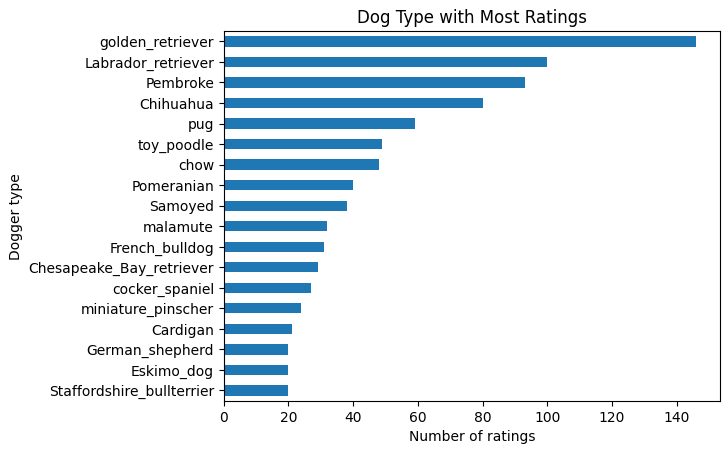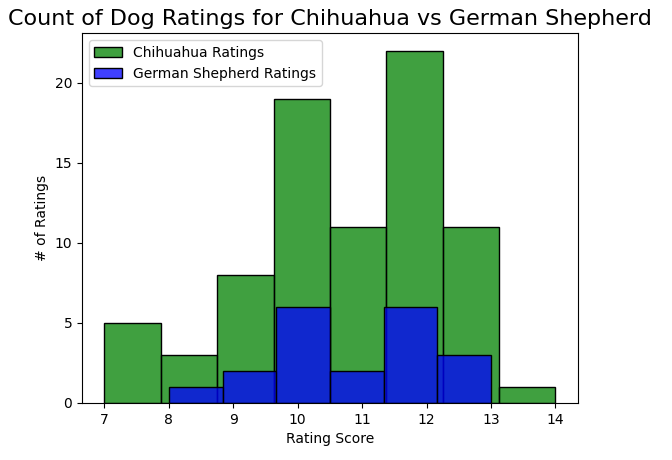Analysis of Tweets for WeRateDogs
Data wrangling WeRateDogs Twitter data to create interesting analyses and visualizations.
Using Python and its libraries, I gathered data from a variety of sources and in a variety of formats, assessed its quality and tidiness, then cleaned it. WeRateDogs is a Twitter account that rates people's dogs with a humorous comment about the dog. These ratings almost always have a denominator of 10. The numerators, though? Almost always greater than 10. 11/10, 12/10, 13/10, etc. Why? Because "they're good dogs Brent." WeRateDogs has over 4 million followers and has received international media coverage.
Questions to be answered by the analysis:
- Which dogger type has the most ratings?
- Do Chihuahua or German Shepherd have more ratings?
- Do Chihuahua or German Shepherd have a higher average rating?
- Anaconda
- Jupyter Notebook
- Python
- pandas
- NumPy
- Matplotlib
- Seaborn
- Pillow
- requests
- json
In this project, I worked on the following three datasets. All datasets are in the data folder.
Enhanced Twitter Archive
The twitter-archive-enhanced.csv file contains a historical archive of tweets. This archive was provided by the WeRateDogs account and then Udacity enhanched the file by pulling out the ratings, dog names, and dog_stage variable. This file was downloaded manually from Udacity.
Additional Data via the Twitter API
The tweet-json.txt file was provided by Udacity since Twitter has changed their API. This file was hosted on Udacity's servers and downloaded programmatically using the Request library.
Image Predictions File
The image-predictions.tsv file contains the results of running every image from the WeRateDogs Twitter archive through a neural network that can classify breeds of dogs. This file was hosted on Udacity's servers and downloaded programmatically using the Requests library.
For this project the following issues had to be assessed:
- Only keep original ratings (no retweets) that have images.
- Assess and clean at least 8 quality issues and at least 2 tidiness issues in this dataset.
- The fact that the rating numerators are greater than the denominators does not need to be cleaned. This unique rating system is a big part of the popularity of WeRateDogs.
- No need to gather tweets beyond August 1st, 2017 since I wouldn't be able to gather the image predictions for those tweets.
- Visual assessment of the data was performed both within
wrangle_act.ipynband in Excel. - Programmatic assessment was performed within the
wrangle_act.ipynd. - A copy of the data was created before cleaning was performed.
- Incorrect
namevalues were replaced with NaN values. tweet_idwas converted to string format since it represented the end of the URL of a tweet.timestampwas converted to datetime.- Tweets that were replies or retweets were removed from the dataset.
- All
rating_denominatorvalues were changed to 10. - All
rating_numeratorvalues greater than 14 were either adjusted or removed from the dataset. - For
rating_numeratorvalues less than 6, each tweet was inspected manually to determine if the image was of a dog or if the rating had to be adjusted. Images that were not dogs were removed from the dataset. - For
rating_numeratorvalues that were given as decimals in the tweet were rounded up to the nearest whole number. - Tweets that had null
expanded_urlsvalues were removed from the dataset. - The
dog_stagecolumn was created and the individual columns for doggo, puppo, pupper, floofer were removed after their respective values were moved to thedog_stagecolumn. - Columns that were not needed for analysis were removed (
source,expanded_urls).
- Visual assessment of the data was performed both within
wrangle_act.ipynband in Excel. - Programmatic assessment was performed within the
wrangle_act.ipynd. - A copy of the data was created before cleaning was performed.
tweet_idwas converted to string format since it represented the end of the URL of a tweet and would enable this dataset to be merged.- For rows that had duplicated values in the
jpg_urlcolumn were removed. I removed the last instance since this was the retweet of an original tweet. - The
dogger_prediction_typecolumn was created to keep either the most confident prediction (dog breed or not) or one of the predictions that was a dog breed, or the first prediction if no breed was detected. - The
dogger_prediction_confidencecolumn was created to keep the confidence interval for thedogger_predicition_typecolumn. - All other columns relating to predicitions was removed from the dataset.
- Visual assessment of the data was performed both within
wrangle_act.ipynband in Excel. - Programmatic assessment was performed within the
wrangle_act.ipynd. - A copy of the data was created before cleaning was performed.
- No issues were addressed with this dataset since it was already complete and in the correct formats.
All the cleaned datasets were merged together and this new dataset was saved as twitter_archive_master.csv in the data folder.
These dog types were determined by the image recognition algorithm and these results have not been confirmed to be accurate.
Golden retriever and Labrador retriever dog types make up the majority of the posts.
Chihuahua have more ratings than German Shepherd. The range of ratings for Chihuahua is more widespread than ratings for German Shepherd.
The average rating for a Chihuahua is 10.79. The average rating for a German Shepherd is 10.95.
Blog post by Saturn Cloud for showing images in Jupyter Notebook
Pillow documentation for displaying images

